ARRIANE STUDY SHOP TEST BANKS AND QUALITY REVISION MATERIALS
Welcome to arriane shop in here there are variety and plenty of revision exams welcome all as we venture into the world of super grades
- 460
- 0
- 26
Community
- Followers
- Following
486 items
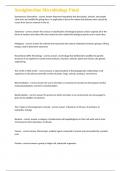
Straighterline Microbiology Final Exam questions and well verified answers
Spontaneous Generation - correct answer Disproven hypothesis that that plants, animals, and people came from an invisible life-giving force. In application it led to the notion that diseases were caused by curses from God or miasmas in the air. Taxonomy - correct answer The science of classification of biological species used to organize all of the forms of modern and extinct life and is based on how related the biological species are to each other Phylogeny - correct answer the scheme tha...
- Package deal
- Exam (elaborations)
- • 3 pages •
Spontaneous Generation - correct answer Disproven hypothesis that that plants, animals, and people came from an invisible life-giving force. In application it led to the notion that diseases were caused by curses from God or miasmas in the air. Taxonomy - correct answer The science of classification of biological species used to organize all of the forms of modern and extinct life and is based on how related the biological species are to each other Phylogeny - correct answer the scheme tha...
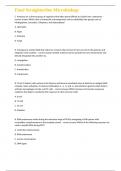
Final Straighterline Microbiology exam questions and 100% revised answers
C. Protozoa are a diverse group of organisms that often prove difficult to classify into a taxonomy. - correct answer Which class of eukaryotic microorganisms can be subdivided into groups such as Mastigophora, Sarcodina, Ciliophora, and Apicomplexa? A. Helminths B. Algae C. Protozoa D. Fungi D. Transposons contain DNA that codes for enzymes that remove it from one site in the genome and integrate it into another. - correct answer Genetic material can be excised from one chromosome and di...
- Package deal
- Exam (elaborations)
- • 5 pages •
C. Protozoa are a diverse group of organisms that often prove difficult to classify into a taxonomy. - correct answer Which class of eukaryotic microorganisms can be subdivided into groups such as Mastigophora, Sarcodina, Ciliophora, and Apicomplexa? A. Helminths B. Algae C. Protozoa D. Fungi D. Transposons contain DNA that codes for enzymes that remove it from one site in the genome and integrate it into another. - correct answer Genetic material can be excised from one chromosome and di...
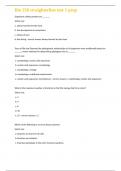
Bio 250 straighterline test 1 exam questions with verified correct answers
Organisms called parasites are ______. Select one: a. always harmful to their host b. the decomposers in ecosystems c. always viruses d. free-living - correct answer always harmful to their host Trees of life that illustrate the phylogenetic relationships of all organisms were traditionally based on ______; newer methods for determining phylogeny rely on ______. Select one: a. morphology; nucleic acid sequences b. nucleic acid sequences; morphology c. morphology; virology d. ...
- Package deal
- Exam (elaborations)
- • 33 pages •
Organisms called parasites are ______. Select one: a. always harmful to their host b. the decomposers in ecosystems c. always viruses d. free-living - correct answer always harmful to their host Trees of life that illustrate the phylogenetic relationships of all organisms were traditionally based on ______; newer methods for determining phylogeny rely on ______. Select one: a. morphology; nucleic acid sequences b. nucleic acid sequences; morphology c. morphology; virology d. ...
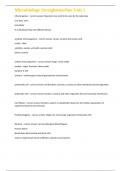
Microbiology StraighterLine unit 1 exam questions and well revised answers
Microorganism - correct answer Organisms too small to be seen by the naked eye Less than 1mm Unicellular If multicellular thay lack different tissues acellular microorganisms - correct answer viruses -protein and nucleic acid, viroids - RNA satellites -nucleic acid with a protein shell prions- protein Cellular microorganisms - correct answer fungi - yeast molds protists - algae, Protozoa, slime molds bacteria -E Coli archaea - methanogens (natural gas)extreme environments prok...
- Package deal
- Exam (elaborations)
- • 8 pages •
Microorganism - correct answer Organisms too small to be seen by the naked eye Less than 1mm Unicellular If multicellular thay lack different tissues acellular microorganisms - correct answer viruses -protein and nucleic acid, viroids - RNA satellites -nucleic acid with a protein shell prions- protein Cellular microorganisms - correct answer fungi - yeast molds protists - algae, Protozoa, slime molds bacteria -E Coli archaea - methanogens (natural gas)extreme environments prok...
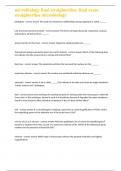
microbiology final straighterline, final exam questions with well verified answers
phylogeny - correct answer The study of evolutionary relationships among organisms is called ______. Last Universal Common Ancestor - correct answer The three cell types discussed, eukaryotes, archaea, and bacteria, all derived from ______. always harmful to their host - correct answer Organisms called parasites are ______. Thermal hot springs warmed by heat from earth's interior - correct answer Which of the following does not indicate microbe involvement in energy and nutrient flow...
- Package deal
- Exam (elaborations)
- • 31 pages •
phylogeny - correct answer The study of evolutionary relationships among organisms is called ______. Last Universal Common Ancestor - correct answer The three cell types discussed, eukaryotes, archaea, and bacteria, all derived from ______. always harmful to their host - correct answer Organisms called parasites are ______. Thermal hot springs warmed by heat from earth's interior - correct answer Which of the following does not indicate microbe involvement in energy and nutrient flow...
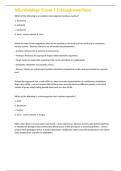
Microbiology Exam 1 (Straighterline) Questions and 100% revised answers
Which of the following is an acellular microorganism lacking a nucleus? a. bacterium b. helminth c. protozoan d. virus - correct answer d. virus Name six types of microorganisms that we are studying in this book and use each one in a sentence. - correct answer - Bacteria: Bacteria are all nonarchaea prokaryotes. - Archaea: Archaea live in extreme environments. - Protozoa: Protozoa are a group of single-celled eukaryotic organisms. - Fungi: Fungi are eukaryotic organisms that can be uni...
- Package deal
- Exam (elaborations)
- • 3 pages •
Which of the following is an acellular microorganism lacking a nucleus? a. bacterium b. helminth c. protozoan d. virus - correct answer d. virus Name six types of microorganisms that we are studying in this book and use each one in a sentence. - correct answer - Bacteria: Bacteria are all nonarchaea prokaryotes. - Archaea: Archaea live in extreme environments. - Protozoa: Protozoa are a group of single-celled eukaryotic organisms. - Fungi: Fungi are eukaryotic organisms that can be uni...
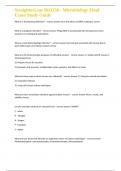
StraighterLine BIO250 - Microbiology Final Exam Study Guide questions and revised correct answers
What is a Transforming Infection? - correct answer Virus that alters cell DNA, leading to cancer What is a lysogenic infection? - correct answer Phage DNA is incorporated into host genome and is passed on to subsequent generations What is a Lytic Bacteriophage Infection? - correct answer Host cell gets so packed with viruses that is lyses (splits) open and releases mature virions What are the three principle purposes of cultivating viruses? - correct answer 1.) Isolate and ID viruses in...
- Package deal
- Exam (elaborations)
- • 19 pages •
What is a Transforming Infection? - correct answer Virus that alters cell DNA, leading to cancer What is a lysogenic infection? - correct answer Phage DNA is incorporated into host genome and is passed on to subsequent generations What is a Lytic Bacteriophage Infection? - correct answer Host cell gets so packed with viruses that is lyses (splits) open and releases mature virions What are the three principle purposes of cultivating viruses? - correct answer 1.) Isolate and ID viruses in...
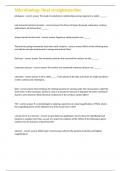
microbiology final straighterline exam questions with 100% verified answers
phylogeny - correct answer The study of evolutionary relationships among organisms is called ______. Last Universal Common Ancestor - correct answer The three cell types discussed, eukaryotes, archaea, and bacteria, all derived from ______. always harmful to their host - correct answer Organisms called parasites are ______. Thermal hot springs warmed by heat from earth's interior - correct answer Which of the following does not indicate microbe involvement in energy and nutrient flow...
- Package deal
- Exam (elaborations)
- • 13 pages •
phylogeny - correct answer The study of evolutionary relationships among organisms is called ______. Last Universal Common Ancestor - correct answer The three cell types discussed, eukaryotes, archaea, and bacteria, all derived from ______. always harmful to their host - correct answer Organisms called parasites are ______. Thermal hot springs warmed by heat from earth's interior - correct answer Which of the following does not indicate microbe involvement in energy and nutrient flow...
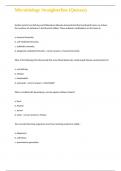
Microbiology Straighterline Exam questions and verified correct answers
Studies by Emil von Behring and Shibasaburo Kitasato demonstrated that inactivated toxins can induce the synthesis of antitoxins in the blood of rabbits. These antitoxins (antibodies) are the basis of... a. humoral immunity b. cell-mediated immunity c. antibiotic immunity d. phagocyte-mediated immunity - correct answer a. humoral immunity Who of the following first discovered that some blood leukocytes could engulf disease-causing bacteria? a. von Behring b. Meister c. Metchnikoff...
- Package deal
- Exam (elaborations)
- • 52 pages •
Studies by Emil von Behring and Shibasaburo Kitasato demonstrated that inactivated toxins can induce the synthesis of antitoxins in the blood of rabbits. These antitoxins (antibodies) are the basis of... a. humoral immunity b. cell-mediated immunity c. antibiotic immunity d. phagocyte-mediated immunity - correct answer a. humoral immunity Who of the following first discovered that some blood leukocytes could engulf disease-causing bacteria? a. von Behring b. Meister c. Metchnikoff...

Straighterline Micro 250 final prep exam questions and revised correct answers
Which class of eukaryotic microorganisms can be subdivided into groups such as Mastigophora, Sarcodina, Ciliophora, and Apicomplexa? A. Helminths B. Algae C. Protozoa D. Fungi - correct answer Protozoa Genetic material can be excised from one chromosome and directly integrated into another via A. conjugation. B. transformation. C. transduction. D. transposons. - correct answer transposons. Which immune cell secretes numerous cytokines that help to coordinate the ...
- Package deal
- Exam (elaborations)
- • 58 pages •
Which class of eukaryotic microorganisms can be subdivided into groups such as Mastigophora, Sarcodina, Ciliophora, and Apicomplexa? A. Helminths B. Algae C. Protozoa D. Fungi - correct answer Protozoa Genetic material can be excised from one chromosome and directly integrated into another via A. conjugation. B. transformation. C. transduction. D. transposons. - correct answer transposons. Which immune cell secretes numerous cytokines that help to coordinate the ...
